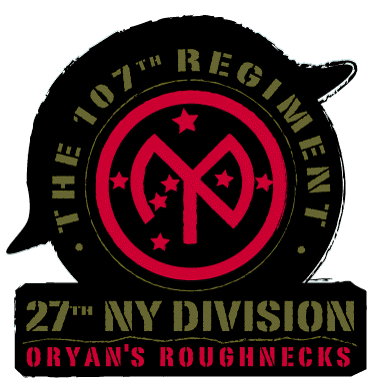BATTLES & ENGAGEMENTS OF THE 27TH DIVISION

|
|
|

This action consisted of constructing and occupying the second position opposite Mont Kemmel during a time when the enemy was expected to make heavy attacks. The position was under close observation from Mont Kemmel and was subjected to observed artillery fire by day and continued fire by night, inflicting daily casualties.
[ KEMMEL AMERICAN MONUMENT ]
DICKEBUSCH SECTOR, BELGIUM
August 21 to 30th, 1918
This action consisted of holding the Dickebusch Sector front line, repelling raids, making raids and patrols, being under continual observed artillery and machine gun fire from enemy position on Mont Kemmel.
VIERSTRAAT RIDGE (vicinity of Mont Kemmel), BELGIUM
August 31 to September 2, 1918The engagement was an advance to occupy the ridge and Mont Kemmel, from which the enemy was believed to be retiring. The enemy was found to be withdrawing his main force to Wyschaete Ridge, but left machine gun nests to hold as long as possible and keeping the entire terrain covered with artillery fire. 27th Division troops continued a following action meeting strong resistance including counter-attacks by enemy infantry.
SOMME OFFENSIVE
THE KNOLL-GILLEMONT FARM-QUENNEMONT FARM, FRANCE
SEPTEMBER 27, 1918This operation was a planned attack with tanks, artillery and machine gun barrage to capture the strong outpost line of the Hindenburg Line. This attack was undertaken by the 53rd Infantry Brigade (105 & 106th Infantry) in an effort to straighten the initial "jumping off" line for the main attack on the 29th. The British III Corps had failed in this attack in the previous weeks. The 53rd Brigade was able to make small gains on the flanks but the strongpoints were not reduced. The failure of this attack was to have dire consequences for the 107th Infantry on the 29th.
HINDENBURG LINE (vicinity of Bony), FRANCE
September 29-30, 1918
The Battle of the Hindenburg Line was a prepared attack; the 3rd British Corps on the left, the Second American Corps (27th and 30th Divisions), The Australian Corps, the 9th British Corps and the French 10th Army participating.AERIAL PHOTOGRAPHS SHOWING 27TH DIVISION'S AREA OF ATTACK
The photos came home with Captain Harold G. Pearson of the 102nd Trains and Military Police / 53rd Infantry Brigade. There is a small group photo of him in O'Ryan's The Story of the 27th Division on page 405.
Mike Munford Collection [1] [2] [3] [4] [5] [6] [7]
FULL DISCRIPTION OF SOMME OFFENSIVE
"OPERATION MAP TO ACCOMPANY FIELD ORDER NO. 17, 25 SEPT, 1918"
Original map
AFTER ACTION REPORT OF LT. RALPH POLK BUELL
"C" COMPANY, 107th INFANTRY
[ BELLICOURT AMERICAN MONUMENT ]
LA SELLE RIVER (vicinity of St. Souplet), FRANCE
October 17, 1918
A prepared attack, the enemy having made a determined stand using the river as a defensive line.
JONC DE MER RIDGE (vicinity of L'Arbre deGuise), FRANCE
October 18, 1918A prepared attack on defended ridge.
ST. MAURICE RIVER (vicinity of Catillon), FRANCE
October 19-20, 1918The battle was an advance, including an attack on machine gun nests with enemy infantry and artillery resistance to the line of the St. Maurice River.


| | |